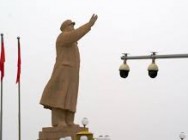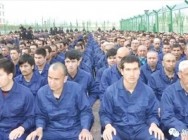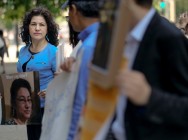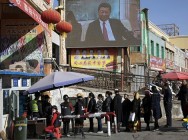Last Minute

- CHINA RELATIONSEAST TURKESTAN PROBLEM AND TURKEY
- FRONTLINE China Undercover
- Elimination of “Uyghur Counter-Revolutionary Officials” in Academic Fields—Exact Quotes Translated from a Mandarin Audio File
- In Push for Trade Deal, Trump Administration Shelves Sanctions Over China’s Crackdown on Uighurs
- Dalai Lama’s 60th Anniversary Symposium: İlshat Hassan speech in English and Chinese
- Uyghur Detainees from Xinjiang ‘Placed in Nearly Every Prison’ in Shandong Province
- Shahrezad Ghayrat, Unrepresented Women
- Uighur Americans Speak Against China’s Internment Camps. Their Relatives Disappear.
- Rozinisa: The true story of the Uyghur girls in the prison
- The Chinese Government Must Account for the Disappearance of the 10+ Million Uyghurs

-

CHINA RELATIONSEAST TURKESTAN PROBLEM AND TURKEY
-

FRONTLINE China Undercover
-

Elimination of “Uyghur Counter-Revolutionary Officials” in Academic Fields—Exact Quotes Translated from a Mandarin Audio File
-

In Push for Trade Deal, Trump Administration Shelves Sanctions Over China’s Crackdown on Uighurs
-

Dalai Lama’s 60th Anniversary Symposium: İlshat Hassan speech in English and Chinese
-

Uyghur Detainees from Xinjiang ‘Placed in Nearly Every Prison’ in Shandong Province
Kashgar College in Xinjiang Threatens Fasting Muslim Students With Expulsion
A college in Kashgar prefecture in China’s troubled Xinjiang region has warned ethnic minority Muslim Uyghur students who fast during the Islamic holy month of Ramadan that they may be expelled.
The Kashgar Normal College’s controversial move came days after officials in Xinjiang told Muslim Uyghur civil servants, students, and teachers not to observe Ramadan, triggering protests from rights groups who called the move discriminatory.
“Our college administration strictly forbids fasting and other Ramadan practices by Uyghur students,” a Uyghur student told RFA’s Uyghur Service, speaking on condition of anonymity, fearing punishment for talking to the foreign media.
“It is clear to us that those who refuse to eat will be warned of expulsion from the college or be deprived of their diplomas,” he said.
During the annual observance of fasting during Ramadan, regarded as one of the “five pillars” of Islam, Muslims eat before the first ray of sunrise and then refrain from eating and drinking till sunset.
But at Kashgar Normal College, Muslim students wanting to break their fast after sunset will not be able to find any open restaurant in or near the campus as the administration has ordered all food outlets in these areas closed during Ramadan. Outlets that violate the order face fines or other punishment.
During fasting hours, the college administration distributes bottles of water and offers free lunches to the students, and those who refuse are blacklisted and their names forwarded to the ruling Chinese Communist Party chiefs at the various faculties, the student said.
Students take risk
Despite the expulsion threat, some Muslim students take the risk and fast, he said.
“Although there are strict rules and their activities are closely monitored, some of the Uyghur students continue to secretly fast.”
They leave classes early and bring back food from the college to break their fast at their dormitories.
Some are caught as the college administration staff often check the bags of the students at the exit, he said.
“If the college authorities find any meals in their bags, the students are forced to consume them on the spot.”
Students who wake up early to have their prefast meal and recite prayers at their dormitories are also penalized.
“If the students turn on the lights to prepare their prefast meals, the college guards will promptly blacklist them,” the student said.
The college has set up video cameras at dormitories and at the corridors of the college to monitor the activities of students,” he said.
“They control all of our activities and private life,” he said. “Our college is not an academic institution but a political camp. If a student hopes to stay in this camp through the duration of the course, he or she must obey the rules and just remain silent.”
Unrest
Exiled Uyghur groups and human rights organizations say Beijing’s repressive policies in Xinjiang, including restrictions during Ramadan and other religious practices, have provoked unrest.
Xinjiang, the traditional home of the Uyghurs, who complain they have long suffered ethnic discrimination, oppressive religious controls, and continued poverty and joblessness, is reeling following a string of high-profile attacks blamed on militants.
Aside from the fasting restrictions, Xinjiang authorities have ordered mosques to use the Ramadan period to publicize Beijing’s year-long anti-terrorism campaign launched following a May 22 bombing at a market in the regional capital Urumqi that killed 43 people, including the four attackers.
Kerry asked to visit mosque in China
Human rights group Amnesty International on Tuesday called on U.S. Secretary of State John Kerry, who is currently visiting China, to raise the fasting restrictions imposed on Uyghur Muslim students with the authorities in Beijing.
Amnesty also asked Kerry, who is in Beijing for a two-day annual Strategic and Economic Dialogue beginning Wednesday, to visit a Uyghur mosque during the China trip.
“Secretary Kerry should raise this restriction directly with the Chinese authorities and visit a Uyghur Mosque during this visit,” Amnesty’s advocacy director T. Kumar said.
“Failing to act will send a wrong message to Chinese leadership that U.S. authorities are not concerned about this restriction,” he said.
Reported by Eset Sulaiman for RFA’s Uyghur Service. Translated by Eset Sulaiman. Written in English by Parameswaran Ponnudurai.
http://www.rfa.org/english/news/uyghur/fasting-07082014215203.html
RELATED NEWS












